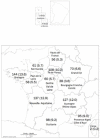National cross-sectional survey on psychological impact on French nursing homes of the first lockdown during the COVID-19 pandemic as observed by psychologists, psychomotor, and occupational therapists
- PMID: 38204978
- PMCID: PMC10778814
- DOI: 10.3389/fpubh.2023.1290594
National cross-sectional survey on psychological impact on French nursing homes of the first lockdown during the COVID-19 pandemic as observed by psychologists, psychomotor, and occupational therapists
Abstract
Objectives: The main objective was to explore the psychological impact of the French lockdown during the first wave of the COVID-19 pandemic on nursing home residents, their relatives, and healthcare teams, as observed by mental health professionals.
Design: A national online cross-sectional survey was conducted from May 11 to June 9, 2020.
Setting and participants: Respondents were psychologists, psychomotor therapists, and occupational therapists (mental health professionals).
Results: A total of 1,062 participants responded to the survey, encompassing 59.8% psychologists, 29.2% occupational therapists, and 11% psychomotor therapists. All mental health professionals felt fear (76.1%), fatigue and exhaustion (84.5%), and inability to manage the emotional burden (78.4%). In nursing homes with COVID-19 cases, residents felt significantly sadder (83.2%), more anxious (65.0%), experienced more anorexia (53.6%), resurgence of traumatic war memories (40.2%), and were more often disoriented (75.7%). The suffering of relatives did not vary between nursing homes with and without COVID-19 cases. The nursing staff was heavily impacted emotionally and was in need of psychological support particularly when working in nursing homes in a low COVID-19 spread zone with COVID-19 cases (41.8 vs. 34.6%).
Conclusion and implications: Primary prevention must be implemented to limit the psychological consequences in the event of a new crisis and to prevent the risk of psychological decompensation of residents and teams in nursing homes.
Keywords: COVID-19 pandemic; families; health professionals; lockdown; nursing homes; psychological impact; residents.
Copyright © 2023 Vaillant-Ciszewicz, Couturier, Segaux, Canouï-Poitrine, Guérin and Bonin-Guillaume.
Conflict of interest statement
The authors declare that the research was conducted in the absence of any commercial or financial relationships that could be construed as a potential conflict of interest.
Figures
Comment on
-
Magnitude, change over time, demographic characteristics and geographic distribution of excess deaths among nursing home residents during the first wave of COVID-19 in France: a nationwide cohort study.Age Ageing. 2021 Sep 11;50(5):1473-1481. doi: 10.1093/ageing/afab098. Age Ageing. 2021. PMID: 33984133 Free PMC article.
References
-
- Canouï-Poitrine F, Rachas A, Thomas M, Carcaillon-Bentata L, Fontaine R, Gavazzi G, et al. Magnitude, change over time, demographic characteristics and geographic distribution of excess deaths among nursing home residents during the first wave of COVID-19 in France: a nationwide cohort study. Age Ageing. (2021) 50:1473–81. doi: 10.1093/ageing/afab098, PMID: - DOI - PMC - PubMed
-
- Blanco-Donoso LM, Moreno-Jiménez J, Amutio A, Gallego-Alberto L, Moreno-Jiménez B, Garrosa E. Stressors, job resources, fear of contagion, and secondary traumatic stress among nursing home workers in face à la COVID-19. J Appl Gerontol. (2021) 40:244–56. doi: 10.1177/0733464820964153, PMID: - DOI - PubMed
Publication types
MeSH terms
LinkOut - more resources
Full Text Sources
Medical


